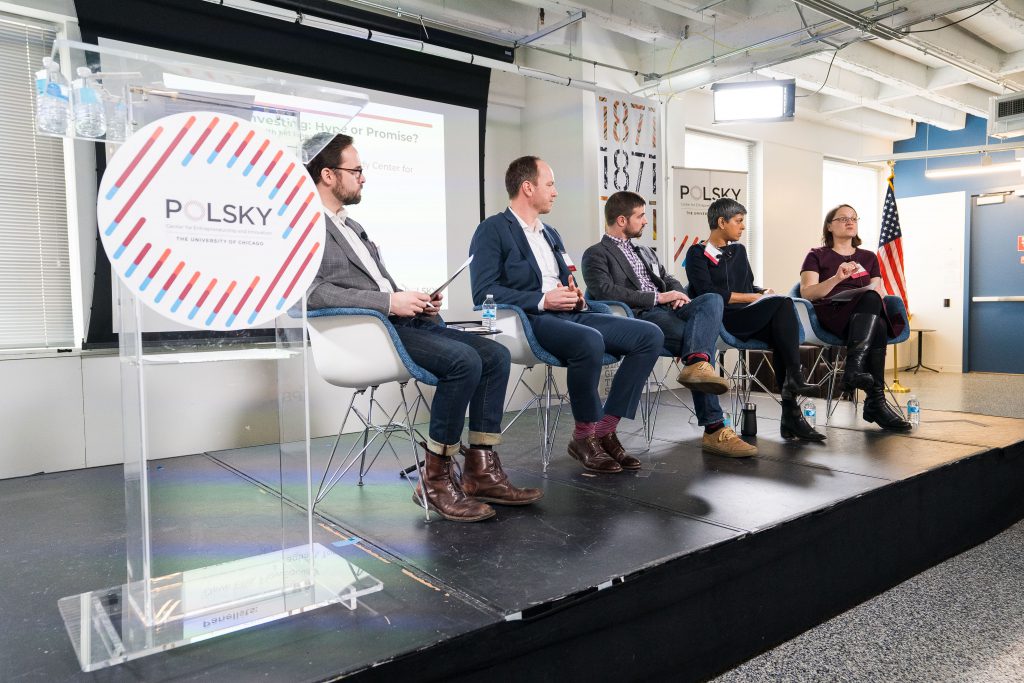SeedCon 2020 Cracks the Myths Associated with Entrepreneurship and Venture Capital

On the surface, it might not seem like impact investing, artificial intelligence, and cannabis have much in common. But, at the Polsky Center for Entrepreneurship and Innovation’s annual SeedCon event, similar themes and narratives emerged from panels and keynote discussions showing these industries do in fact have some similarities.
For the past 12 years, the Polsky Center and Chicago Booth’s Entrepreneurship and Venture Capital (EVC) Group have cohosted SeedCon, a conference dedicated to shining a light on entrepreneurship and venture capital. The conference provides opportunities for entrepreneurs, investors, and members of the startup ecosystem to explore emerging industry themes and connect over shared ideas.
This year’s theme, Beyond the Hype, explored how successful entrepreneurs and venture capitalists have identified key challenges and opportunities in their given industry. Moving away from the often-used buzz words, experts discussed risk taking, how technology can address human error, regulations, and more. The conference featured keynote speakers Ravin Gandhi, founder and CEO of GMM Nonstick Coatings, and Scott Case, cofounder and CEO of Upside Business Travel.
During the day-long conference, these were some of the common trends discussed:
Be careful not to let the hype take over. Be intentional about making an impact
For the first time in SeedCon history, an entire panel was dedicated to impact investing, a fairly new term and trend that has been building on what began 20 years ago. In short, the impact investing industry pays special attention to the positive effect a potential investment will have.
“One area that we have had to be careful about is that impact is defined differently depending on who you are talking to,” said cofounder and managing director of Flow Equity Dave Ellis.
With challenges often associated with becoming an entrepreneur, impact investing brings another layer of uncertainties. According to the panel, impact can be applied to every industry, though creating a successful business model for the social space takes passion, motivation, and persistence.
AI is everywhere
In the era of Netflix, Hulu, Siri, and facial recognition, it’s almost impossible to find some portion of your day-to-day life that isn’t touched by artificial intelligence (AI). However, in a world that is becoming more and more dependent on technology, there are certain human skills that will be hard to replace.
“Human skills are needed to build a successful AI business,” said vice president and general manager of sales and partnerships at Machinify Maryam Saleh, PhD’ 11. “Technology will always be a challenge, but making the sale of something others can understand is dependent on human skills.”
The future of AI has two distinct possibilities: A much darker side and one that will make a positive impact on society. Continuing at the rapid rate AI is currently progressing at, knowledge work will eventually be displaced by algorithms, reducing the cost of products for consumer purchase. Additionally, complex decisions where humans often fail will be made obtainable with AI, potentially making inaccurate diagnoses or treatment plans soon a thing of the past.
The cannabis industry is here for a good time and a long time
As of January 1, 2020, marijuana is now available for recreational purchase in the state of Illinois. And, because regulations differ from state to state, it is difficult to create consistency across the industry. However, with 40% of adults occasionally using marijuana, the market is extremely strong and here to stay.
According to founder and CEO of Leaf Trade Jay Yi, an initial challenge the cannabis industry faced was the limited number of markets to tap in to. With more states legalizing recreational purchase, “the rest of the industry is just starting to grow [in size].”
Be a people person
During their keynotes, both Ravin Gandhi and Scott Case shared stories about how teaming up with others during the entrepreneurship journey contributed to their success.
“Starting your own company is awesome, but join someone else who is early on,” said Case. “Find someone fantastic who [you] can work with and learn from them.”
Because entrepreneurship can already be lonely and difficult to navigate, having a cofounder to bounce ideas off of and get feedback from, while maintaining self-confidence, can dictate the trajectory of a new company.
SeedCon 2020, which attracted more than 200 attendees, served as a platform to explore the nuances of some of today’s most talked about industries. Learn more here.